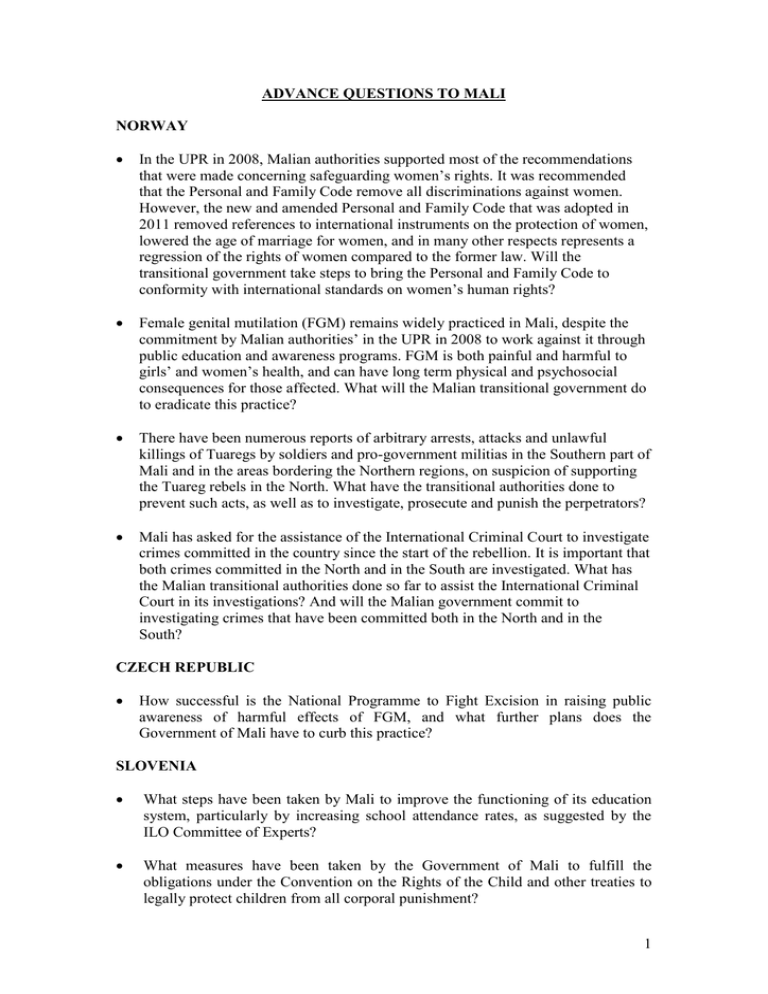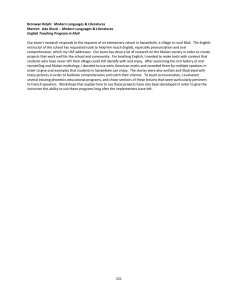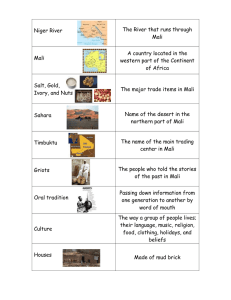In the UPR in 2008, Malian authorities supported most of the... that were made concerning safeguarding women’s rights. It was recommended
advertisement

ADVANCE QUESTIONS TO MALI NORWAY In the UPR in 2008, Malian authorities supported most of the recommendations that were made concerning safeguarding women’s rights. It was recommended that the Personal and Family Code remove all discriminations against women. However, the new and amended Personal and Family Code that was adopted in 2011 removed references to international instruments on the protection of women, lowered the age of marriage for women, and in many other respects represents a regression of the rights of women compared to the former law. Will the transitional government take steps to bring the Personal and Family Code to conformity with international standards on women’s human rights? Female genital mutilation (FGM) remains widely practiced in Mali, despite the commitment by Malian authorities’ in the UPR in 2008 to work against it through public education and awareness programs. FGM is both painful and harmful to girls’ and women’s health, and can have long term physical and psychosocial consequences for those affected. What will the Malian transitional government do to eradicate this practice? There have been numerous reports of arbitrary arrests, attacks and unlawful killings of Tuaregs by soldiers and pro-government militias in the Southern part of Mali and in the areas bordering the Northern regions, on suspicion of supporting the Tuareg rebels in the North. What have the transitional authorities done to prevent such acts, as well as to investigate, prosecute and punish the perpetrators? Mali has asked for the assistance of the International Criminal Court to investigate crimes committed in the country since the start of the rebellion. It is important that both crimes committed in the North and in the South are investigated. What has the Malian transitional authorities done so far to assist the International Criminal Court in its investigations? And will the Malian government commit to investigating crimes that have been committed both in the North and in the South? CZECH REPUBLIC How successful is the National Programme to Fight Excision in raising public awareness of harmful effects of FGM, and what further plans does the Government of Mali have to curb this practice? SLOVENIA What steps have been taken by Mali to improve the functioning of its education system, particularly by increasing school attendance rates, as suggested by the ILO Committee of Experts? What measures have been taken by the Government of Mali to fulfill the obligations under the Convention on the Rights of the Child and other treaties to legally protect children from all corporal punishment? 1 What measures will the Government of Mali take with regard to the issue of Female Genital Mutilations and other harmful practices? MEXICO Est-ce que les tribunaux pour enfants et l’application des peines de substitution à l’emprisonnement des enfants sont déjà opérationnels ? En cas affirmatif, combien de sentences ont été présentées ? Quels sont les principaux obstacles pour la mise en œuvre de la Convention d’abandon des mutilations génitales féminines dans les communautés qui ont signé cet accord ? NETHERLANDS Women’s rights: FGM During the last UPR, Mali acknowledged the need to legally prohibit female genital mutilation (FGM), even though priority was given to public awareness and education. Despite these measures the prevalence of FGM is still unacceptably high. Have the above mentioned measures been sufficient to deal with FGM? If not, what measures will the government take in the future concerning FGM? What is the current point of view of the government on enacting legalization prohibiting all forms of FGM? Women’s rights The Netherlands is concerned about the the new family law. According to this legislation, women are obliged to obey their spouses and are permitted to marry at the age of 16. This is contrary to Mali’s obligations under international treaties such as the United Nations Convention on the Elimination of all forms of Discrimination against Women (ratified in 1985), which it has signed Does the government intend to amend the family law, thereby harmonizing Mali’s laws with international codes? Freedom of expression (press freedom) We are pleased with Mali’s record on freedom of press and its position in the constitution. However, in the turmoil of the coup in March, journalists were hindered in doing their work by arresting them. Has the government taken any action against people involved in obstructing the free press of Mali? 2





